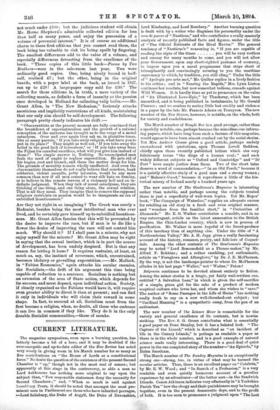CURRENT LITERATURE.
The magazine symposium, even upon a burning question, has latterly become a bit of a bore, and it may be doubted if the ever-energetic and up-to-date editor of the New Review has acted very wisely in giving room in his March number for so many as five contributions on "the House of Lords as a constitutional force." No doubt the question of the existence of the present Second Chamber is "up," though not in the most real of senses ; but apparently at this stage in the controversy, so able a man as Lord A shbourne has nothing more original to say upon the subject than, "Few responsible statesmen deny the necessity for Second Chambers ;" and, "When so much is said against hereditary Peers, it should be noted that amongst the most pro- minent men in Parliament are those who have inherited peerages, ■ —Lord Salisbury, the Duke of Argyll, the Duke of Devonshire,
Lord Kimberley, and Lord Rosebery." Another burning question is dealt with by a writer who disguises his personality under the nom de guerre of " Nauticus," and who contributes a really masterly analysis of recently published facts and figures, under the title of "The Official Estimate of the Rival Navies." The general tendency of " Nauticus's " reasoning is, "If you are capable of reading the signs of the times you will be very restless and uneasy for many months to come, and you will not allow your Government, upon any short-sighted pretence of economy, to impose upon you a naval programme that stops short of triumphantly and convincingly securing to you the maritime supremacy to which, by tradition, you still cling." Ifnder the title of "Apologia pro arts met," Mr. Quilter replies in a lively fashion to his critics ; and in "Nearing the Rapids," Mrs. Lynn Linton continues her resolute, but now somewhat tedious, crusade against, Wild Women. It is hardly time as yet to pronounce on the value of "An Illustrated Love-Epic," by Thackeray, which has been unearthed, and is being published in instalments, by Mr. Gerald Fiennes ; and we eonfess to seeing little but crudity and violence in a paper by the late Mr. Francis Adams on Tennyson. The new number of the New Review, however, is notable, on the whole, both for variety and readableness.






































 Previous page
Previous page